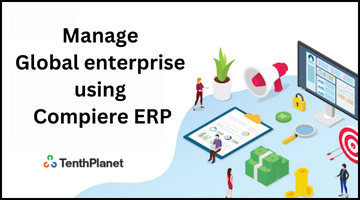Can I use Compiere ERP system to manage a global enterprise?

Nowadays, it is very common that all businesses to have offices in different locations. While choosing any ERP system for your business, it is vital to analyse what is needed and be clear on the impacts it will create in your native and remote offices. By choosing Compiere ERP, we assure that your ERP system can grow with you, even if you don’t make use of its global-ready features in your initial deployment.
Global-ready features in Compiere ERP
- Multi-Organization
- Multi-Currency
- Multi-Accounting
- Multi-Tax
- Multi-Language
Let’s see each global ready feature of Compiere ERP in detail.
Compiere ERP Support “Multi-Organization”
Multi-Organization features helps in secured data sharing in between different organizational entities. Ex: A holding company that has so many fully owned subsidiaries running as independent businesses. Compiere ERP enables the executive management to view the consolidated financials and performance data of their business.
Multi-organization support in Compiere ERP uses three entity levels:
System – Contains infrastructure information of Compiere ERP instance, enabling
Compiere ERP to support multiple independent businesses. New Windows, User Interface
changes, Currency Rates are typically defined at System Level.
Tenant (company) – This entity contains definitions of consolidated business information and accounting structure such as products, warehouses and, other business-wide elements.
Organization – Creation of transactions happen here. Organizations may keep their own information and data structure which are not shared by other Organizations within a company. For reporting purposes, Organizations can be structured in hierarchies and review user access in terms of security. Hierarchies are defined as division, branch, or business unit structures within an organization.
Multi-organization structures support “role-based security”. With this feature, you can control
role and user-level read and write data privileges at each level.
Multiple legal entity accounting support by Compiere ERP, helps in checking whether the transactions are crossing legal entity boundaries or not and are accounted for correction. Ex: Selling organization is a different legal entity than the product-owning organization.
Simulate and Implement Re-Organizations
Now, acquisitions and separations in organizations has become very common. Compiere ERP is capable of simulating and implementing any business changes by keeping the business up and running. This makes Compiere ERP to stand ahead of other traditional ERP systems who projects it as a costly and a time-consuming one.
You can simulate the impacts of reorganizing your organization on financial statements prior to implementing changes, by using multiple organizational hierarchies, along with your primary hierarchy.
“Multi-Currency” Features in Compiere ERP
As all businesses trading across the globe, multi-currency support becomes a much-needed one.
Compiere ERP fully supports multiple currency transactions, with the capability to:
- Send / Receive in multiple currencies
- Update transactions
- Have bank accounts in multiple currencies
- Concisely report multi-currency transactions, including translation
- Account for transactions in parallel using multiple currencies
- Maintain currency-specific price-lists
- Define customer-preferred currency
“Multi-Accounting” Support in Compiere ERP
Compiere ERP supports parallel accounting standards for any combination mentioned below:
- Accrual and Cash-based Accounting
- Different accounting standards (e.g., US GAAP, UK SAP, German HGB)
- Different inventory costing methods (e.g., Standard, Average, FIFO)
- Different currencies
In general, a “Set of Books” is defined as a set of transactions with the same Chart of Accounts (CoA), Calendar, Accounting Currency, Accounting Standard and, Costing Method.
There are some insufficient scenarios such as:
- Differences in rounding and conversion
- Need of more manual effort to convert
- Missing audit trail
- More Time to get the needed results
- Not able to convert due to missing detailed information
Compiere ERP supports multiple accounting through the concept of an Accounting Schema.
An Accounting Schema is a combination of any of the below:
- Chart of Accounts
- Accrual or Cash-based accounting
- Accounting standard
- Costing method
- Accounting currency
Note, that Set of Books is different from Calendar as it is not directly part of an Accounting Scheme. Because, in an accounting schema, you can have multiple calendars. The calendar is reduced to transaction support functions (open/close periods, summary postings, allocation definition ease of entry).
Compiere ERP has a key advantage in terms of design for parallel accounting. Compiere ERP can differentiate the transaction details and the resulting accounting consequences has the following benefits:
- No replication in Transaction data
- Add or discard an accounting scheme anytime
- Create accounting information for historical transactions
- Change or update any attribute (and optionally regenerate the accounting)
- Easy to extend and maintain parallel accounting practices
Transactions such as inventory updates and invoice payments, for example; Finishing high priority accounting asynchronously with lower priority based on the system load
Compiere ERP Can Handle “Multi-Tax”
Compiere ERP offers a robust tax engine with for sales taxes and, value-added taxes support and integrate with third party tax services as well.
The tax engine finds out the correct tax amount based on:
- Transaction time
- Product category
- Ship from/to location and
- Invoice from/to location
Internationalize with Compiere ERP “Multi-Language”
Compiere ERP supports operation in multilingual environments and fully internationalized.
Compiere ERP enables multiple language support by design, as text strings were kept as separate files and not on source code. The Compiere ERP using UNICODE that helps in supporting wide range of character sets and languages. Compiere Active Data Dictionary support localized customizations.
Users can select their preferred language while logging into Compiere ERP. Business documents, such as invoices, are generated based on the preferred language of the associated business partner. The default language for Compiere is US English. For additional language packs, get it from Compiere partners and the Compiere community.

Regardless of the language chosen for operation and documents, Compiere ERP enforces your business rules and practices.
Grow your business using the global ready features of Compiere ERP.
Get Started
